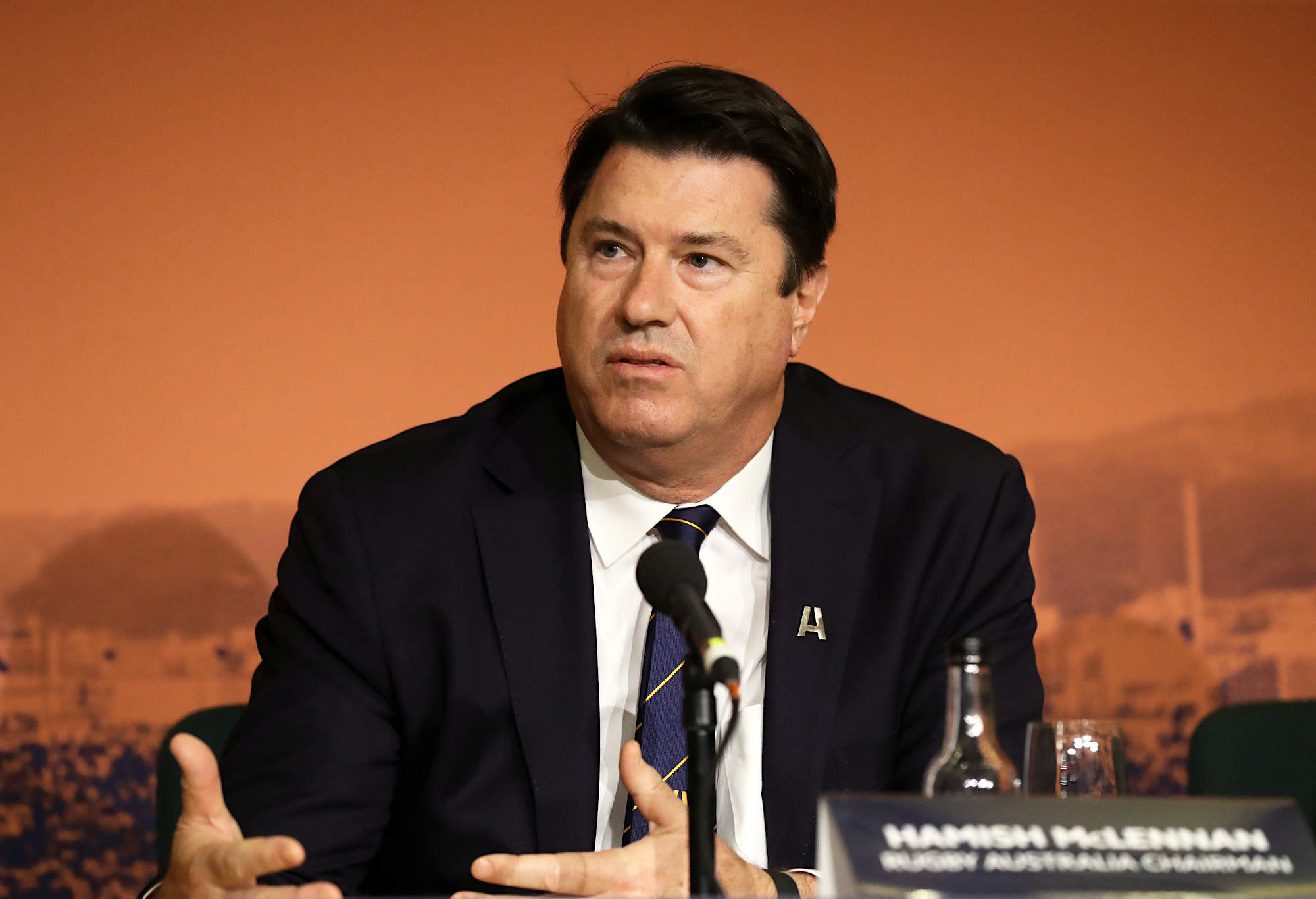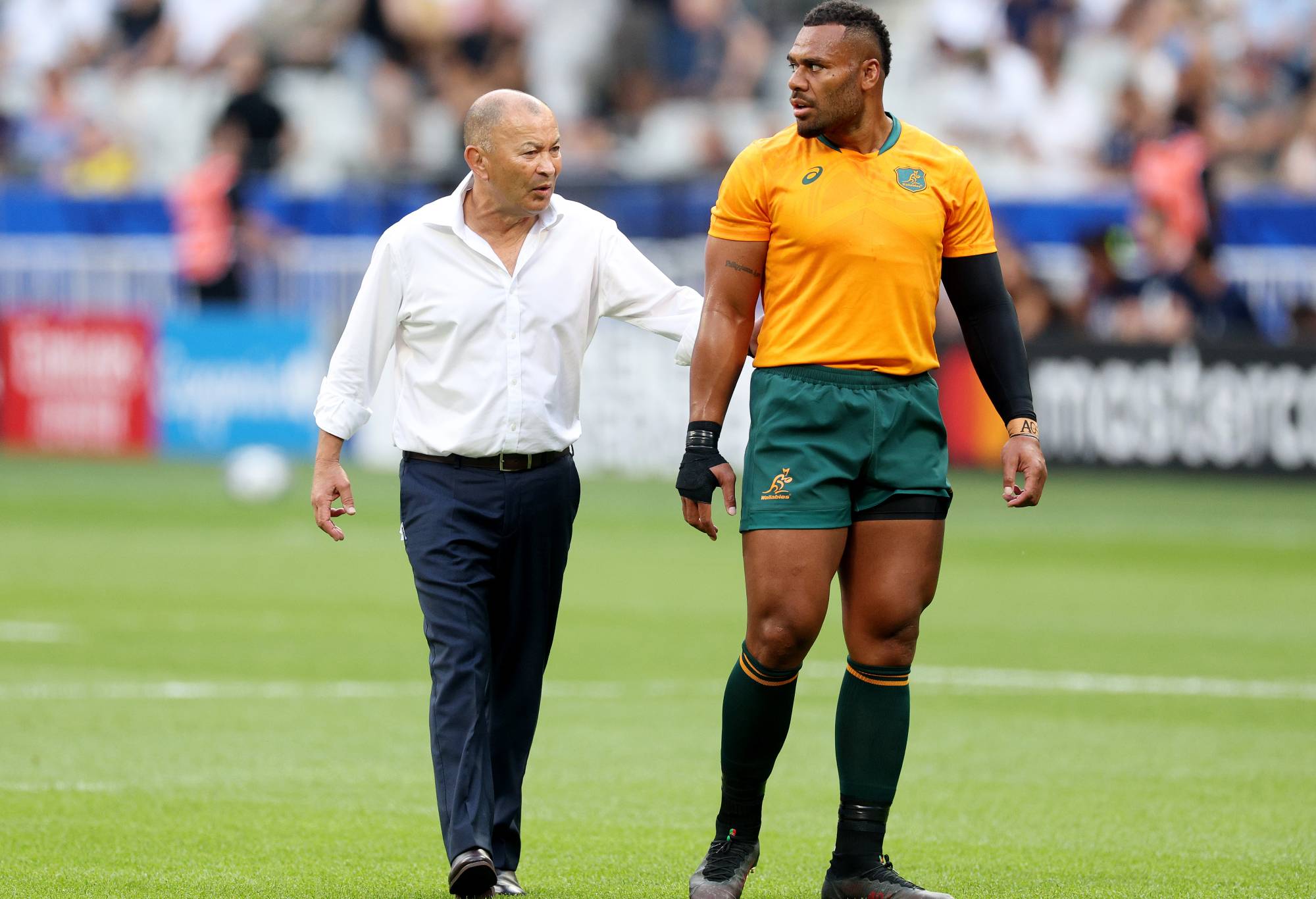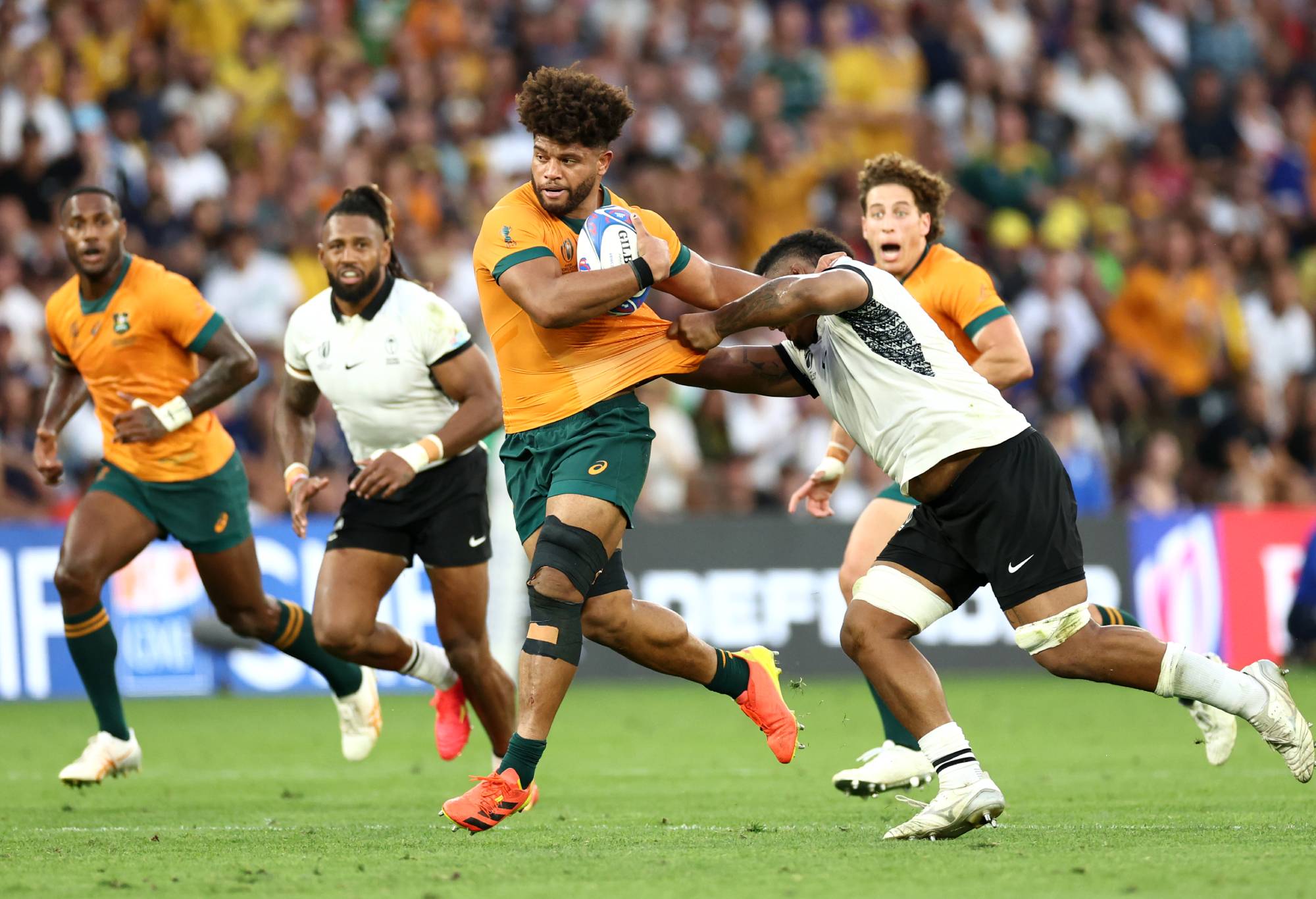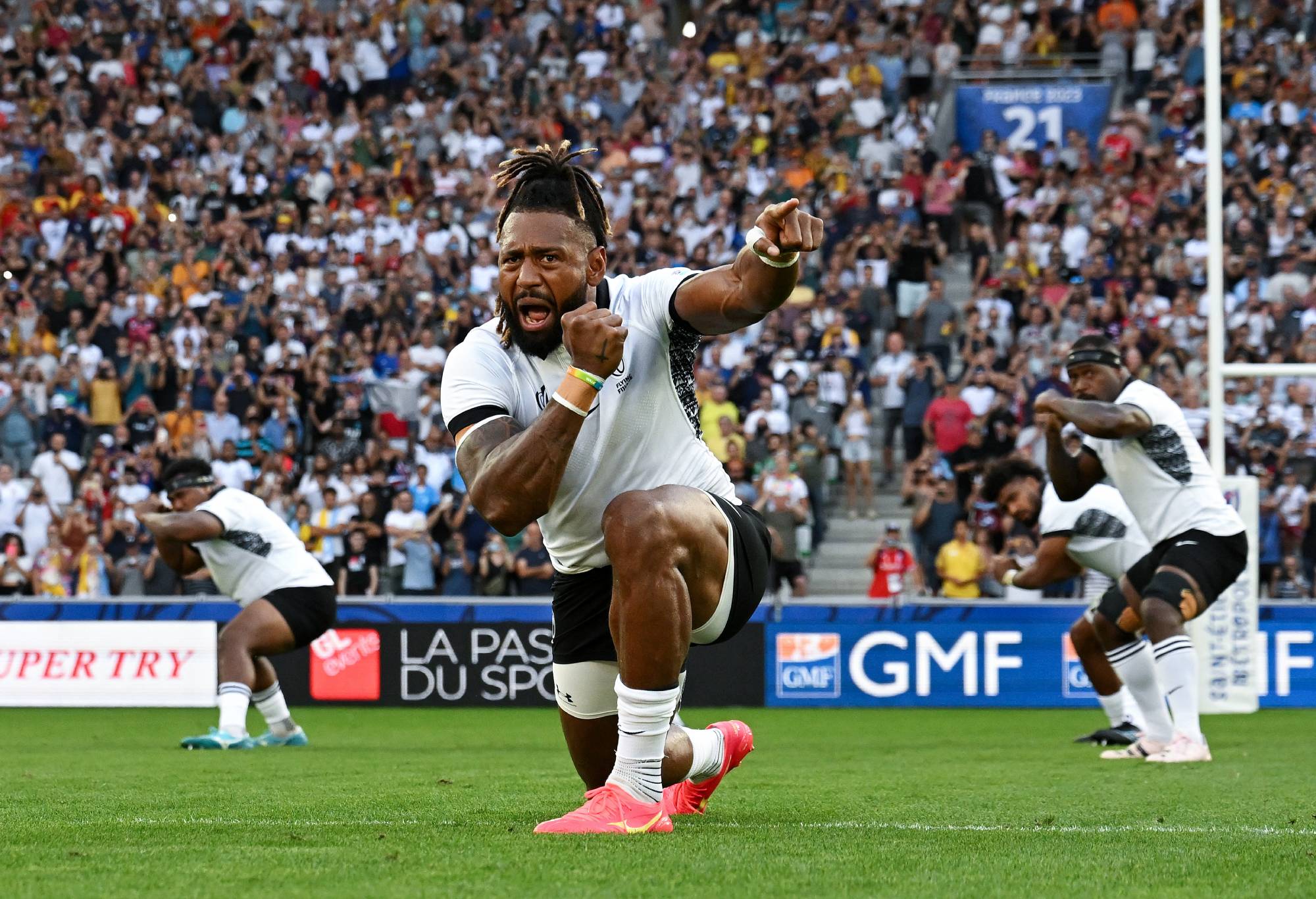So much for this column being a late-in-the-week, casual stroll around the edges of this World Cup, ticking off a few culinary delights and cultural highlights ahead of the Wallabies taking on Wales in a ‘must win’ Pool C encounter, in Lyon, on Sunday.
Rugby Australia chairman Hamish McLennan threw a spanner in the works when he got onto the front foot midweek, going public to frame this World Cup campaign the way he’d like it to be framed.
Excuse the paraphrasing, but McLennan essentially laid the blame for the 22-15 loss to Fiji on the 20 years of maladministration of Australian rugby that preceded his appointment, and reiterated how his hiring of Eddie Jones, and this World Cup, was all about building a side to contend in 2027.
Setting aside a major reason for the loss being how good Fiji is, that’s too clever by half, I’m afraid. You see, McLennan’s problem is that, even when you think you can play people for fools, people don’t like being made to feel foolish.

Rugby Australia Chairman Hamish McLennan. (Photo by Oisin Keniry – World Rugby/World Rugby via Getty Images)
Since when was the realistic expectation of the tens of thousands of Wallabies fans who dragged themselves out of bed in the middle of the night, or who coughed up big coin to support their side in France, that this World Cup was nothing more than a familiarisation exercise for a few young players, to have them ready for 2027?
The comments of McLennan – and Jones singing from the same hymn sheet – smack of convenience and revisionist history. And they are far removed from what was said when coach Dave Rennie was punted and Jones handed the keys.
Those were the heady days that promised a “smash and grab” raid on the Cup. Where McLennan, in justifying burning the best part of $1m to jettison Rennie said, “I would rather we have somebody who’s really tough and we win World Cups, than we have a Kumbaya session, everyone holds hands and we fail.”
There’s a view that the World Cup has attained a level of importance that is unhealthy and disproportionate. Where everything revolves around a four-yearly cycle that provides bragging rights to the victorious nation and underpins the funding of the sport at a global level, but sucks oxygen from the game and diminishes the rugby played in between.
But whether we like it or not, that’s where the game has got to. And Australian fans are totally within their rights to ask why, if other countries are having a crack at winning the sport’s premier trophy, one that only comes around every four years, why aren’t we having a crack too?

Eddie Jones with Samu Kerevi. (Photo by Warren Little/Getty Images)
After all, as recently as August, McLennan told The Australian about the importance of reconnecting rugby to “our culture, our swagger and who we want to be as Australians”, before fitting the squad out with team-issue Akubras.
But instead of following that gesture by tapping into the fighting Aussie spirit, and rallying fans to the cause for Sunday’s must-win match, McLennan chose to call it early, saying, “Yes, it’s disappointing what happened, but we’re firmly fixated on 2027.”
You can’t help but notice the use of past tense.
How about being “firmly fixated” on Sunday against Wales? Exactly what is a Wallabies player, preparing for a crucial elimination match, having that comment fed back to them by family and friends, supposed to think? That whether he spills blood for his country or not, his boss has already moved on?
It’s an extraordinary admission of defeat from the head of an Australian sport; one that I can’t recall there being a precedent for.
There is of course a reason why McLennan went public this week. Two in fact. Self-interest and avoidance of accountability.
McLennan can’t afford to wait for the Wallabies to lose, and the accompanying shitstorm, and then be trying to defend his actions from a position of weakness. Instead, the narrative is framed beforehand; ‘yes it’s bad, but this is exactly how I told you it would be, and trust me to make it better.’
Nobody is denying the mistakes made over the last 20 years. Or that Australian rugby’s federated governance structure and its geographic imbalances are chronic impediments.
But McLennan would have us believe that it is only he who has stumbled upon these, and it is only he who now is capable of putting measures in place to remedy them.
It also assumes a more centralised structure is actually the fix-all and success at international level will automatically follow. Anyone who knows Australian rugby knows the problems run far deeper than that.
Note how McLennan came to the chairman’s role in June 2020, over three years ago. He is certainly not responsible for what occurred before then, but he is surely accountable for his own decisions; the coaching change and the extravagant pursuit of Joseph Suaalii for starters.
Make sure of your place in the stands to see the British and Irish Lions in 2025. Tour packages on sale now at Wallabies Travel

Rob Valetini runs the ball against Fiji. (Photo by Chris Hyde/Getty Images)
Ask anyone associated with the Wallaroos program what they think of the progress made in the last three years, under McLennan.
Much has been made of Jones’ motley coaching group, and how it lacks the hardened Test rugby experience of other leading nations. That’s the price paid by McLennan for inserting Jones so close to the World Cup; the best assistant coaches already locked into jobs and, when his group was finally cobbled together, only having a few months to prepare and then gel with the players.
These things only matter of course, if you believe that Australia should put its best foot forward at every World Cup, not announce a seven-year plan on the run, at the whim of a chairman who knows better than everyone else.
Multiple sources close to Jones and the Wallabies camp suggest there is no way Jones will be at the helm of the Wallabies in 2027. What will McLennan say then; that this too was all part of the plan?
For what it’s worth, I’m backing Eddie and his team in on Sunday. Because despite all of the selection queries, the injuries, the chronic lack of on-field leadership, the confusing game plans and so on, that’s what we came to France for. To see the Wallabies give things a proper shake. Not to see them warm up for 2027.
It helps too, that their opponent is beatable. As I mentioned elsewhere this week, if there’s one rugby nation that does internal chaos and self-loathing as well as Australia, it’s Wales.
A Twitter/X exchange between Drew Mitchell and Fiji coach Simon Raiwalui highlighted how the focus on Australia’s woes tended to overshadow and diminish Fiji’s performance in St Etienne.
It was a point fairly made by Raiwalui, who is of course intimately tapped in to Australia’s rugby culture. But to be fair to Mitchell, it is possible to walk and chew gum at the same time.
There wouldn’t have been a single Wallabies fan who left Geoffroy Guichard Stadium, albeit disappointed and in some cases angry, not acknowledging the all-round excellence of Fiji; their line-out excepted.
For all money, Fiji looked like the settled, soberly coached, single-minded, fully-prepared side that Australia isn’t. They were also able to get far more pay from their two French Top 14 players, Levani Botia and Josua Tuisova, than Australia was able to from theirs, Richie Arnold and Will Skelton (injured).
A look into Fiji’s coaching box provided some interesting insights, including Wallabies and Waratahs discards, and an ex-international referee. Other nations have worked closely with referee advisors in the lead-in, but is the appointment of Glen Jackson to a formal coaching role one of the masterstrokes of the tournament?

Fiji’s Waisea Nayacalevu leads his teammates performing the Cibi before playing Australia. (Photo by World Rugby/World Rugby via Getty Images)
As impressive as Fiji were at scrum, maul and the breakdown, it was their composure and discipline that really caught the eye.
Before the match started the World Cup nearly had its first murder, as the two stadium announcers at Geoffroy Guichard Stadium went head-to-head in a whole-hearted, no-holds-barred contest to split eardrums.
For those who weren’t there, think a producer having a quiet word to gravel-throated shouter Jimmy Barnes, and telling him, ‘mate, I think you’re holding something back, give us the real Barnsey!”
This week’s mini-break took me to delightful Annecy, not far from the Swiss border, where the weather was perfect for strolling lakeside and in and around the charming old town.
That was after I got the full culinary experience from chef Harry Jones; his tasty ‘Cape Malay’ chicken dish, accompanied by Persian rice, payback for the braised oxtail I’d thrown his way last year in Melbourne.
There was time midweek to catch Australian referee Angus Gardner spend more time working the TMO than ruling things on the field, such was the insistence of Italy and Uruguay to try to rumble the ball across the line in a mass of bodies.
That’s not a criticism; Gardner can’t rule on things he can’t see. But match times are ballooning and rugby badly needs to figure out a way to speed these things up.
































































































